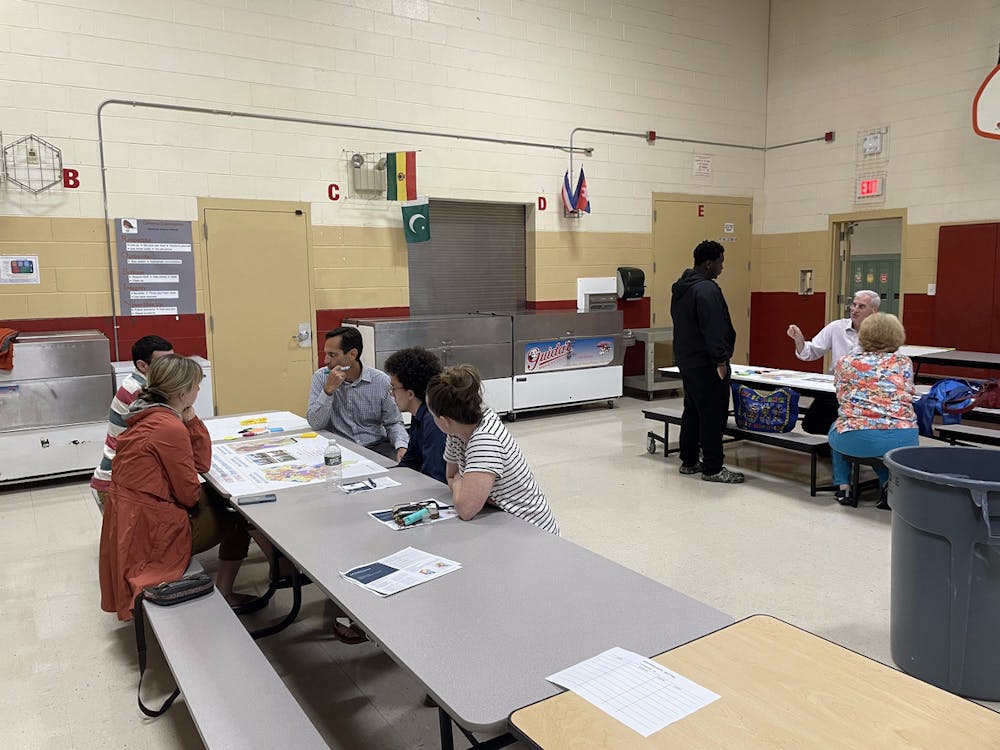On a rainy Monday night last week, nearly two dozen Providence residents filed into the Reservoir Avenue Elementary School gymnasium in the city’s eighth ward.
They sat down at cafeteria tables arranged underneath basketball hoops and covered with maps of the city and their neighborhood. Blank sheets of poster paper, colorful markers and sticky notes were placed on either end of each table.
The evening started with a discussion of traffic safety — people driving too fast down one street or the other. Someone’s going to get killed, residents told Ward 8 Councilman James Taylor. But soon, the conversation shifted to the evening’s main attraction: Providence’s Comprehensive Plan.
The Sept. 11 neighborhood meeting was one of fifteen listening sessions — one for each of Providence’s wards — to be held across the City this fall focused on the comprehensive plan. The meetings are part of a broader community engagement initiative that began last year involving citywide events, tabling across neighborhoods and online surveys.
“We’re taking feedback in lots of different ways, in lots of different places,” Deputy Director of the Department of Planning and Development Robert Azar told attendees.
The plan, which lays out a vision for the future of Providence’s urban development and policy, is updated once a decade, most recently in 2014. Every municipality in Rhode Island is required by the state to make such a plan.
According to Providence’s Department of Planning and Development, in addition to guiding development and land use regulations, the plan “must address community concerns such as housing, parks, transportation, community services” and more.
“It really is the foundation of all other planning efforts in the city,” Azar explained after the meeting. “It becomes (the) official land use policy for the city. … This is the time for people to weigh in.”
A 2022 survey — conducted as part of the Department of Planning and Development’s “Listen and Learn” phase of community engagement around the plan — found that addressing building quality and affordable housing is the top priority for Providence over the next two decades.
That remains true in Ward 8, which Azar called a “microcosm” of the city.
“If you can’t afford to live in Providence, then nothing else really matters,” said one resident during the question and answer portion of the meeting. “Is that part of the plan?”
Azar said that improving housing affordability would be part of the plan and asked the crowd what they thought about changing some of the single-family zoning in the ward to multi-family zoning. Everything has trade-offs, he explained.
“We need to put housing units into the market and we need to figure out where to do that,” he said. “I would argue we’re in a housing crisis.”
Dave Talan, president of the Reservoir Triangle Neighborhood Association, also highlighted the issue of housing availability.
“You can’t take a ‘not in my backyard’ attitude. I mean, they (have) got to build housing somewhere,” Talan said. “We just want to make sure it’s done right.”
For Talan, that means preserving green space in the neighborhood — not paving over it to make room for parking spaces. He added that he wants each neighborhood in the City to have at least one school that is within walking distance from the people who live there.
Aaron Hill, a public school teacher who said that he spends half of his take-home paycheck on rent, thought the meeting went well. Hill, who is a member of the Providence Urbanist Network, also said public transit, walkability and meeting climate goals were among his top priorities.
“The discussion here was incredibly civil,” he said. “We’ve got people coming with a wide diversity of ideas about where the city should head, but I’m really glad to hear (it) repeated that regardless of background, people understand the (housing) affordability crisis.”
Brenda McBride, another attendee, said that she did not realize that the discussion was more than the typical neighborhood meeting. She explained that she’s worried about litter and noise pollution. “They need to be diligent and really do what they say,” McBride said.
Azar said that he continually hears concerns regarding housing affordability but noted that he also has heard from homeowners who are “concerned about issues that might come with growth and change.”
According to Azar, strategies to address the housing shortage might include “loosening zoning regulations” and helping “developers pay to create affordable housing” in addition to subsidies on the federal, state and local levels.
Azar added that there have also been concerns about how climate change will affect the city. Improving sustainability and climate resilience was the second highest priority of those surveyed by the city planning department last year.
Azar expects that the plan “will have a certain degree of fluidity” as it moves through the various stages of official approval. “Just as we’re gathering a diversity of opinions through this process, we’ll see that through the official process as well,” he said.
The plan will have to be reviewed and approved by the City Plan Commission, City Council and the state by January 2025, according to Azar. When the dust settles, Azar said the plan will likely include policy changes related to housing and land use, transportation, sustainability and climate resilience.

Jacob Smollen is a Metro editor covering city and state politics and co-editor of the Bruno Brief. He is a junior from Philadelphia studying International and Public Affairs.





